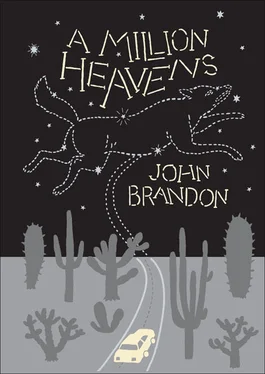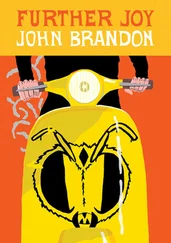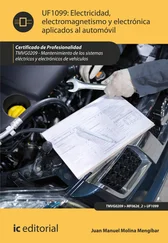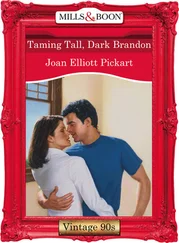She had been harboring the irrational hope that Arn would show up at the vigil. The vigils were hers now, something he’d lost in the breakup. Fitting, because they’d been hers to begin with. There were only three of them now. The vigil group had withered week to week before Dannie’s eyes but she still didn’t know how it had come to this — only three. The college-age girl looked so tired, her face all shadows. And then there was the arrogant man with the pin-covered coat. Both of them had cast strange looks at Dannie when she’d walked up and settled in without Arn. They knew they’d never see him again.
Part of the parking lot had been repaved. When Dannie had first shown up the smell had been overpowering, but now she was used to it. She felt lightheaded. When the time came to leave no one moved. Usually the vigils ended naturally, the vigilers a unit, a herd, but tonight someone was going to have to lead. Dannie hoped she could count on the other two vigilers to show up next week and the week after and the week after, but counting on people was foolish. Worrying about being alone seemed to be a good way to wind up alone. Dannie wondered if the others were hoping she’d stay like she was hoping they would, and she wondered if they felt weak for hoping that, for needing someone else to be alone with.
He still had his high school football helmet. He’d never turned it back in — had stolen it, if you wanted to put it that way. The helmet was silver with a green facemask. His high school, over near Golden, had been poor and still was. You could tell the high schools with money by their soft sod fields. Mayor Cabrera’s school had a gridiron of mown weeds.
He remembered the bus rides, wondering if he would be a different person in Albuquerque or in Santa Fe. He got to return kicks for a season, when the little slick guy broke his collarbone. Mayor Cabrera always went around the first tackler and through the second. That had been his method. The coaches had always pointed Mayor Cabrera out as an example of heart and toughness, never as an example of speed or agility or power.
Mayor Cabrera was sitting in the basement of the motel, his palm pressed against the cool dome of the helmet. He recalled the feeling of waiting for a kickoff, rocking leg to leg in the calm before the tornado. He remembered getting prepared mentally to enter that closed circuit of chaos, wondering if the chaos, that particular return, would be on his side or against him. And then he thought of Margot, a girl who had taken a liking to him junior year and who would rise to her feet in the stands and cheer Mayor Cabrera’s name in the quiet before the ball was kicked. Mayor Cabrera remembered being embarrassed by that, by Margot cheering for him. He could remember fearing looking over and making eye contact with her more than he feared being smacked by a linebacker with a fifty-yard head of steam. This girl Margot had made it where she and Mayor Cabrera were lab partners when they dissected frogs, and he had clammed up and barely said a word to her, standing right next to her for two entire class periods, tiny organs on display in a tray in front of them. This girl had intimidated Mayor Cabrera to the point that he could not discern whether she was pretty. Now, in his memory, with her heart-shaped face blooming up from a turtleneck in the stands, she was angelic. Mayor Cabrera had been frightened of her, and when she’d given him a letter just before Christmas break professing her affection he had made no acknowledgment. He never, in fact, spoke another word to her. In the spring they didn’t have any classes together and eventually Margot wound up dating another boy and then during senior year she moved away to somewhere unfathomable like Minnesota. There’d been Margot and then there’d been Mayor Cabrera’s wife, some years later, and now there was Dana — the three women Mayor Cabrera would never stop thinking about. Margot had knobby little knees and Mayor Cabrera had always marveled that she didn’t fall over when she walked. She had seemed both wiser and more naïve than Mayor Cabrera, back in high school, sage yet also silly, but it was just that she hadn’t been afraid. He had no idea what had happened to it, the letter. He kept everything, but he didn’t have that letter. He could still see the handwriting, which wasn’t cursive but was still bold and loopy.
Mayor Cabrera put away the football helmet. It was the middle of the night but he felt wide awake, so he went up and cleaned the windows in the lobby and dusted the countertops and the desk. He put new candy in the dish and squared up the rug and filed some stray paperwork. Put more paper in the printer. Replenished the coffee supplies. After that he went out front and swept in front of the carport and then, out of tasks, wandered back to the basement and found himself sitting at the big metal table with a sheet of printer paper in front of him. He found himself writing a letter. He dove right in, parsing out the difference between wanting someone and needing someone and which was worse. Nowhere did he write Dana’s name. He wrote of the trouble of having his feelings ripen rather than rot. He wrote about the back of her knee when she bent her leg, about her tiny ears. He wrote about thinking of her with other men and having his heart fold up and collapse. Of her practice of wearing a different perfume in each season, and how he hadn’t smelled the winter fragrance this year. Other men had, but Mayor Cabrera had not. He wrote down all the nicknames Dana called him and that he’d never once called her a nickname, had never addressed her in a whisper as anything but Dana. He wanted to call her something other than the name her mother had given her. He wanted to call her Love. Mayor Cabrera wrote of the time he’d visited her, going onto another page now, one of his first appointments, when he’d arrived and could tell she’d been crying, her eyes puffy and voice wavering, and he hadn’t asked her what was wrong. If he ever saw her again, that would be the first thing he’d ask, what had upset her that day. He wasn’t afraid of the answer. He wasn’t afraid of Dana’s past or her present. He wasn’t afraid for his own feelings.
Mayor Cabrera wasn’t calming down, but he wasn’t feeling as crazy. It wasn’t late. It was 11:30. He hadn’t eaten dinner. He wrote that the night was an evil time but not when he was with her because then he wanted the night to last forever. Mayor Cabrera felt that Dana was his oasis and he wrote that down too and then he rested his pen. He didn’t need to worry if everything in the letter made sense because he wasn’t going to send it. It wasn’t really a letter. He picked the papers up and gazed at them, as if they held a landscape rather than a frenzy of words, listening to the sand brushing against the high basement windows. He didn’t ball the pages up. He folded them in half and then filed them down in the empty garbage can in the shadow of the big table.
The sun was a sour note lingering in his temples. He got his headache about this time, like clockwork, about an hour after his breakfast of jerky and pretzels and coffee. It was like a visitor, the headache, a companion. It might have been brought on by the arid glare, but it also had something to do with lack of whisky. The gas station owner had brought none at all, and that had been an error, but he would’ve been out by now anyway. He could only have brought a bottle or two. He’d get past it. He was glad he’d at least brought sunglasses. He’d never used them before, had always considered them womanly, like sandals or scarves, but he’d never been in this much glinting late-winter sun and he’d never quit whisky.
Читать дальше












